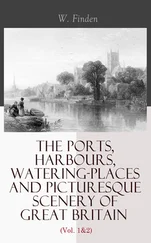Another suspect was William Nutt, who had seemed to predict his own discovery of Saville's body. He had a grudge against Samuel, who had prosecuted a member of his family for stealing apples from the Road Hill orchard. Some named Nutt as Elizabeth Gough's imagined lover. 'I do not think there are grounds for the suspicion entertained relative to the witness "Nutt" who found the child,' Whicher wrote, 'as it appears very natural that he would have made the remark of "looking for a dead child as well as a living one" as at that time he and Benger had searched other places and were then going to search the privy.' As for the suggestion 'that he was improperly connected with the Nursemaid, there is not the slightest grounds for that suspicion, as she in the first place was not acquainted with him and in the next place I do not suppose she hardly ever spoke to him nor would condescend to speak to him in any way much more as an admirer, as she is rather a superior girl for her station in looks and demeanour, while on the other hand "Nutt" is a slovenly dirty man, weakly, asthmatical, and lame'.
Whicher steadfastly defended Gough's innocence. He said he saw nothing in her conduct to make her a likely suspect. This ignored her strange contradictions about the time at which she became aware that Saville's blanket was missing: at first she said she had noticed before his body was found, then that she noticed only afterwards. But if this was a lie rather than a confusion, it seemed a pointless one. There was no need for Gough to conceal her knowledge that the blanket had been taken - it would have been natural for her to check the bedding carefully. By changing her story, she only drew suspicion to herself. A similar ambiguity hung over her account of why she did not raise the alarm when she noticed Saville was missing at 5 a.m.: her delay seemed odd; yet if she had been guilty, she would surely not have brought it up at all. Some thought it suspicious that Gough had not mentioned Saville's absence to Emily Doel, her assistant, just before seven on the morning of his disappearance; Whicher thought her silence 'seems to tell in her favour', because it indicated that she really did believe the boy's mother had taken him, and that there was no cause for alarm. He also pointed to the innocence implied by the words she used when she roused Mrs Kent at 7.15: 'Are the children awake?'
The police in Isleworth, Gough's home town, had been directed to make inquiries about her character, and the report they sent on 19 July accorded with Whicher's perceptions: she 'is well known to be respectable, quick, kind, good tempered and very fond of children'. As for her supposed lover, the detective could find no evidence 'that she was even acquainted with any male person, either at Road, or the Neighbourhood'.
Some people speculated that Mrs Holley had destroyed Constance's nightdress in order to incriminate the girl and protect William Nutt, who was married to one of her daughters - the fullest version of this theory identified five conspirators: Nutt, Holley, Benger (whom Samuel Kent had apparently once accused of overcharging him for coal), Emma Sparks (the nursemaid who testified about the bedsocks, and had been dismissed by Samuel the previous year) and an unnamed man whom Samuel had prosecuted for fishing in the river. There was little evidence against any of them, other than the mildly suspicious fact that Mrs Holley claimed to have heard a rumour before Monday, 2 July that a nightdress was missing. Whicher had an explanation for this: 'The rumour about the nightdress . . . must have related to Mary Ann's stained nightdress, which the police had confiscated and examined but which had that morning been returned to her.'
On Sunday, Samuel Kent was given permission to visit his daughter in prison. He was accompanied to Devizes, another Wiltshire wool town, by William Dunn, a widowed solicitor born in east London and living in Frome. (Rowland Rodway had resigned as Samuel's legal representative because he believed Constance was guilty; he later agreed to represent Mrs Kent, who must have shared his view.) This case was far outside Dunn's regular remit. In the county court the previous month he had represented a man who had been sold a faulty turnip-cutter, and another whose cow had developed a lump as fat as two fists after being 'pogged' (poked with a stick) by a rival dairy farmer.
When they reached the gaol - designed like a wheel, with the governor's office at the hub and a hundred cells radiating out from it - Samuel found himself unable to face his daughter and sent Dunn to her cell in his stead. His reasons were inscrutable. The Times said that 'the feelings of the father overcame him, and he was unable to undergo the interview', but did not make clear whether these were Samuel's feelings as a father to Constance or to Saville: he might have collapsed under the weight of his pity for Constance, or of his horror at her. The Bath Chronicle echoed the uncertainty: 'he could not bear the ordeal of an interview with his daughter, and, therefore, remained in an adjoining room, while the solicitor conferred with Miss Kent'. It could be that Samuel recoiled from any discussion of his son's death. In the weeks since the murder, his strategy had seemed to be silence. 'Mr Kent has never alluded to the murder to me from first to last,' Elizabeth Gough remarked later. 'The young ladies have, and so has Miss Constance, but not Mr Kent. Master William has frequently cried over it.'
When Dunn visited Constance in her cell, she repeatedly told him that she was innocent. The solicitor sent to a local hotel for a comfortable mattress, to make her week in gaol more pleasant, and arranged for her to be provided with special rations.
A prison officer afterwards briefed the waiting reporters. 'We are credibly informed that Miss Kent's demeanour in the prison was calm and quiet,' said the Western Morning News , 'and that she appeared to be conscious of her innocence and ashamed of being placed in such a position.'
'We understand she was perfectly calm and collected throughout the interview,' said the Bath Chronicle , 'as, indeed, she has continued to be since her incarceration, although the painfulness of her awfully critical position had, very naturally, wrought somewhat of a change in her features; still, her general demeanour has made such an impression upon the officials of the Gaol, that they do not hesitate to state that her appearance, at all events, bespeaks her innocence of this horrid transaction.'
CHAPTER TEN
TO LOOK AT A STAR BY GLANCES
23-26 July
At the time he was assigned the murder at Road, Whicher had twice before led investigations into the mysterious death of a small boy. One was the case of the Reverend Bonwell and his illegitimate son, which even now was being heard at the Court of Arches, the chief ecclesiastical court in London. The other took place a decade earlier, in December 1849, when a police superintendent from Nottinghamshire turned up at Scotland Yard and asked for the help of the London detectives in a suspected infanticide. Whicher was given the case.
A man in North Leverton, Nottinghamshire, had informed the police that he had received, by post, a box containing the corpse of a boy. The child was dressed in a frock, a straw hat, socks and boots, and wrapped in an apron marked 'S Drake'. The man told the police that his wife had a sister called Sarah Drake who worked as a cook and housekeeper in London.
Whicher and the Nottinghamshire superintendent went directly to the house in which Sarah Drake worked, 33 Upper Harley Street, and charged her with killing the child. 'How do you know that?' she asked. They told her about the apron marked with her name. She sat down and cried.
The same night at the police station Drake confessed to the 'searcher' employed to examine her clothes and belongings that she had killed the boy, whose name was Louis. He was her illegitimate son, Drake told the searcher, and for the first two years of his life she had managed to keep her job as a servant by paying another woman to look after him. When she had fallen behind with the payments, though, the foster mother angrily returned Louis to her. Terrified of losing her 'place' in Upper Harley Street, which paid about PS50 a year, Sarah Drake had strangled her son with a handkerchief. She then packed him up in a box and sent him to her sister and brother-in-law in the country, hoping that they would bury him.
Читать дальше












